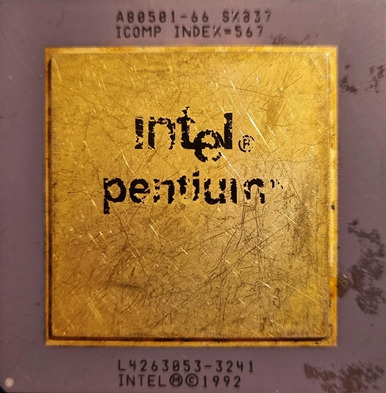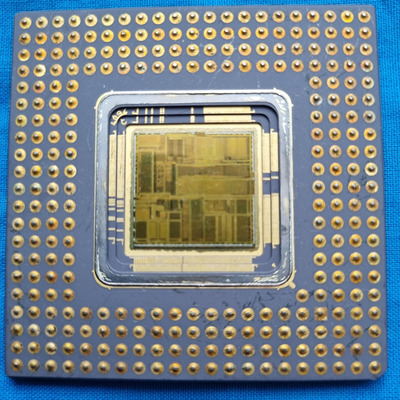First post, by karakarga
Hello everyone,
As far as I know, there was a Pentium bug on first group of manufactured processors between 60 ~ 100 MHz. 120 MHz and up, does not have the FDIV bug! I have a complete list.
B5 stepping based Pentium 90 test without the bug, at this link https://www.youtube.com/watch?v=2OgP2WH5l_0 and there says https://forum.vcfed.org/index.php?threads/nee … fdiv-bug.18501/ all 63 & 83 MHz 486 overdrive processors are not affected!
Wikipedia also says: "The FDIV bug affects the 60 and 66 MHz Pentium P5 800 in stepping levels prior to D1, and the 75, 90, and 100 MHz Pentium P54C 600 in steppings prior to B5. Starting from 120 MHz (P54C and P54CQS) CPU's and up are, unaffected." https://en.wikipedia.org/wiki/Pentium_FDIV_bu … Affected_models
Pentium Overdrive for 486 systems --> Socket 2/3
Product Code -- Type -- Family -- Model -- Stepping -- Core stepping -- Clock rate -- FSB speed -- sSpec -- Version
PODP5V63 -- 1 -- 5 -- 3 -- 1 -- B1 -- 63 MHz -- 25 MHz -- SZ953 -- 1.0 (*) Not affected!
PODP5V63 -- 1 -- 5 -- 3 -- 1 -- B2 -- 63 MHz -- 25 MHz -- SZ990 -- 1.1 (*) Not affected!
PODP5V63 -- 1 -- 5 -- 3 -- 1 -- C0 -- 63 MHz -- 25 MHz -- SU013 -- 1.0 (*) Not affected!
PODP5V83 -- 1 -- 5 -- 3 -- 2 -- C0 -- 83 MHz -- 33 MHz -- SU014 -- 2.1 (*) Not affected!
Pentium P5 800 nm 5V --> Socket 4
Family -- Model -- Stepping -- Core stepping -- Clock rate -- FSB speed -- sSpec
5 -- 1 -- 1 -- B1 -- 60 MHz -- 60 MHz -- Q0352, Q0412, SX753
5 -- 1 -- 3 -- B1 -- 66 MHz -- 66 MHz -- Q0353, Q0413, SX754
5 -- 1 -- 5 -- C1 -- 60 MHz -- 60 MHz -- Q0466, SX835, SZ949
5 -- 1 -- 5 -- C1 -- 66 MHz -- 66 MHz -- Q0467, SX837, SZ950
5 -- 1 -- 5 -- D1 -- 60 MHz -- 60 MHz -- Q0625, SX948, SX974 (*) Not affected!
5 -- 1 -- 5 -- D1 -- 66 MHz -- 66 MHz -- 00626, 00627, SX949, SX950 (*) Not affected!
Pentium Overdrive for 586 systems --> Socket 4
Product Code -- Type -- Family -- Model -- Stepping -- Core stepping -- Clock rate -- FSB speed -- sSpec -- Version
PODP5V133 -- 0 -- 5 -- 1 -- aA -- tA0 -- 120/133 -- 60/66 -- SU082 -- 1.0 (*) Not affected!
Pentium P54C 600 nm 3.3V --> Socket 5/7
Family -- Model -- Stepping -- Core stepping -- Clock rate -- FSB speed -- sSpec
5 -- 2 -- 1 -- B1 -- 75 MHz -- 50 MHz -- Q0601
5 -- 2 -- 1 -- B1 -- 90 MHz -- 60 MHz -- Q0542, Q0613, Q0543, SX879, SX885, SX909, SX874
5 -- 2 -- 1 -- B1 -- 100 MHz -- 66 MHz -- Q0563, Q0587, Q0614, SX886, SX910
5 -- 2 -- 2 -- B3 -- 75 MHz -- 50 MHz -- Q0606, SX951
5 -- 2 -- 2 -- B3 -- 90 MHz -- 60 MHz -- Q0628, Q0611, Q0612, SX923, SX922, SX921, SX942, SX943, SX944, SZ951
5 -- 2 -- 2 -- B3 -- 100 MHz -- 66 MHz -- Q0677, SX960
5 -- 2 -- 4 -- B5 -- 75 MHz -- 50 MHz -- Q0704, Q0666, SX975, SX961, SZ977 (*) Not affected!
5 -- 2 -- 4 -- B5 -- 90 MHz -- 60 MHz -- Q0653, Q0654, Q0655, SX957, SX958, SX959, SX978 (*) Not affected!
5 -- 2 -- 4 -- B5 -- 100 MHz -- 66 MHz -- Q0656, Q0657, Q0658, SX962 (*) Not affected!
5 -- 2 -- 5 -- C2 -- 75 MHz -- 50 MHz -- Q0700, Q0725, Q0749, SK079 (*) Not affected!
5 -- 2 -- 5 -- C2 -- 90 MHz -- 60 MHz -- Q0668, SX999, SZ995, SU031 (*) Not affected!
5 -- 2 -- 5 -- C2 -- 100 MHz -- 50/66 MHz -- Q0697, Q0698, SX963, SX970, SZ996, SU032 (*) Not affected!
5 -- 2 -- 6 -- E0 -- 75 MHz -- 50 MHz -- Q0837, Q0846, SY005, SY009, SU097, SU098 (*) Not affected!
5 -- 2 -- 6 -- E0 -- 90 MHz -- 60 MHz -- Q0783, SY006, SL2WW, (*) Not affected!
5 -- 2 -- 6 -- E0 -- 100 MHz -- 50/66 MHz -- Q0784, SY007, SU099, SU110 (*) Not affected!
Pentium Overdrive for 586 systems --> Socket 5/7
Product Code -- Type -- Family -- Model -- Stepping -- Core stepping -- Clock rate -- FSB speed -- sSpec -- Version
PODP3V125 -- 0 -- 5 -- 2 -- cC -- aC0 -- 125 -- 50 -- SU081 -- 1.0 (*) Not affected!
PODP3V150 -- 0 -- 5 -- 2 -- cC -- aC0 -- 150 -- 60 -- SU083 -- 1.0 (*) Not affected!
PODP3V166 -- 0 -- 5 -- 2 -- cC -- aC0 -- 166 -- 66 -- SU084 -- 1.0 (*) Not affected!
PODPMT60X150 -- 1 -- 5 -- 4 -- 4 -- oxA3 -- 125/150 -- 50/60 -- SL24V -- 1.0 (*) Not affected!
PODPMT66X166 -- 1 -- 5 -- 4 -- 4 -- oxA3 -- 166 -- 66 -- SL24W -- 1.0 (*) Not affected!
Note: The attached picture is a Pentium 66 processor based on SX837 core stepping, which has the infamous FDIV Pentium bug, I have destroyed it a long time ago being useless for me! [Opened back cover and removed all pins.]

